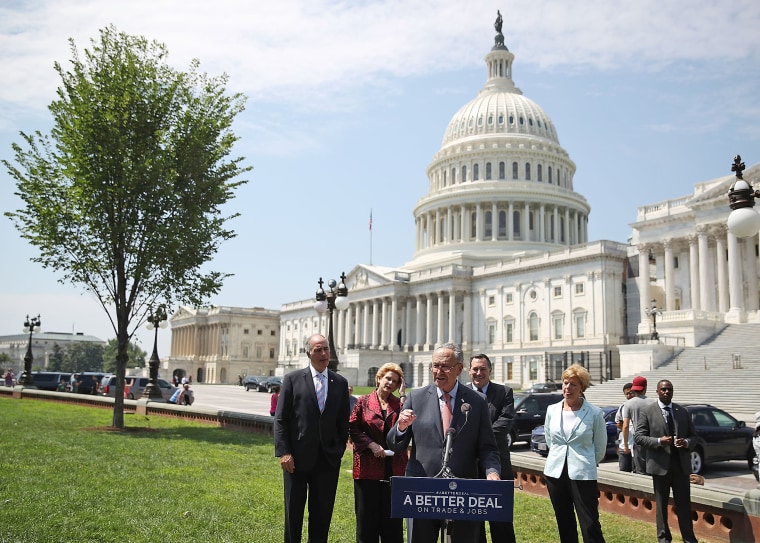Last month, congressional Democrats unveiled their “Better Deal” agenda ahead of the 2018 midterm elections, promising new and improved ideas to push the party forward. But while some of their policies might be seen as improvements, not much is new.
“[M]any Americans don’t know what we stand for,” Senate Minority Leader Chuck Schumer, D-N.Y., wrote in the New York Times previewing this agenda.
“In the last two elections,” Schumer said, “Democrats … failed to articulate a strong, bold economic program for the middle class and those working hard to get there. We also failed to communicate our values to show that we were on the side of working people, not the special interests. We will not repeat the same mistake.”
“Our agenda is focused on efforts to create jobs and raise incomes for American workers, to lower the cost of living for American families, and to build an economy that gives every American the tools to succeed in the 21st century,” added House Minority Leader Nancy Pelosi, D-Calif., in the Washington Post.
But many of the "Better Deal" proposals are similar to what Barack Obama and Hillary Clinton campaigned on — and talked about — over the last several years, although congressional Democrats contend their new plans are bolder.
Take, for example, their call to stop price-gouging on prescription drugs.
“We’re going to fight for rules to stop prescription drug price gouging and demand that drug companies justify price increases to the public,” Schumer said.
But here was Obama on price gouging when he signed an executive order aimed at reducing drug shortages. “The shortage of prescription drugs drives up costs, leaves consumers vulnerable to price gouging and threatens our health and safety,” he said. “This is a problem we can’t wait to fix.”
In September 2015, after the price of a specialty drug was raised from $13.50 to $750 overnight, candidate Hillary Clinton tweeted, “Price gouging like this in the specialty drug market is outrageous.” The next day, she proposed a $250 per month cap on drug spending for Americans with chronic illnesses and conditions.
The Democrats’ "Better Deal" also targets monopolies and big corporations. “We will demand that proposed mergers meet tough new standards to protect competition before approval,” Pelosi said.
Yet last year, the Clinton campaign released a fact sheet calling for a “new commitment to promote competition, address excessive concentration and the abuse of economic power, and strengthen antitrust laws and enforcement.”
Another parallel: Democrats are calling for tax credits to businesses that provide apprenticeships and training for unemployed Americans — a strategy Schumer says will bring millions “back into the labor force or retrained to secure full-time, higher-paying work.”
Yet apprenticeships were featured in Clinton’s 100-day jobs plan, which she presented at a Las Vegas campaign rally last August: “I want to give every business a $1,500 tax credit if they will train apprentices … pay those apprentices while they’re getting trained so more people can take advantage of that opportunity.”
And then there’s Democrats’ more recent call for an “independent trade prosecutor to combat trade cheating.”
Sound familiar? Here was Clinton in June 2016: “I am going to appoint a trade prosecutor who will report to the president so we are going to end the abuse of our market, our workers, our people.”
Other similarities between the "Better Deal" and past Obama and Clinton proposals: Investing in America’s infrastructure and raising the minimum wage.
While Democratic rhetoric on prescription-drug costs, job training, infrastructure and the minimum wage might not be new, a Democratic official tells NBC News that their "Better Deal" agenda aims to better emphasize these proposals — as well as provide the party’s candidates with a unified message.
“Our main job is to give broad, big picture research to our candidates to help them personalize it, localize it, and see the importance of talking about the economy in their districts,” says Meredith Kelly, communications director for the Democratic Congressional Campaign Committee.
Kelly adds that Democratic polling concluded that Democratic and swing voters “are deeply dissatisfied with the direction of the economy and their place in it.” And many of these voters’ priorities, Kelly says, are reflected in the "Better Deal."
The idea, said Kelly, is to communicate a stronger economic message “so that [the Democratic Party] can be as competitive as possible with Republicans when it comes to our trustworthiness on the economy and jobs.”
